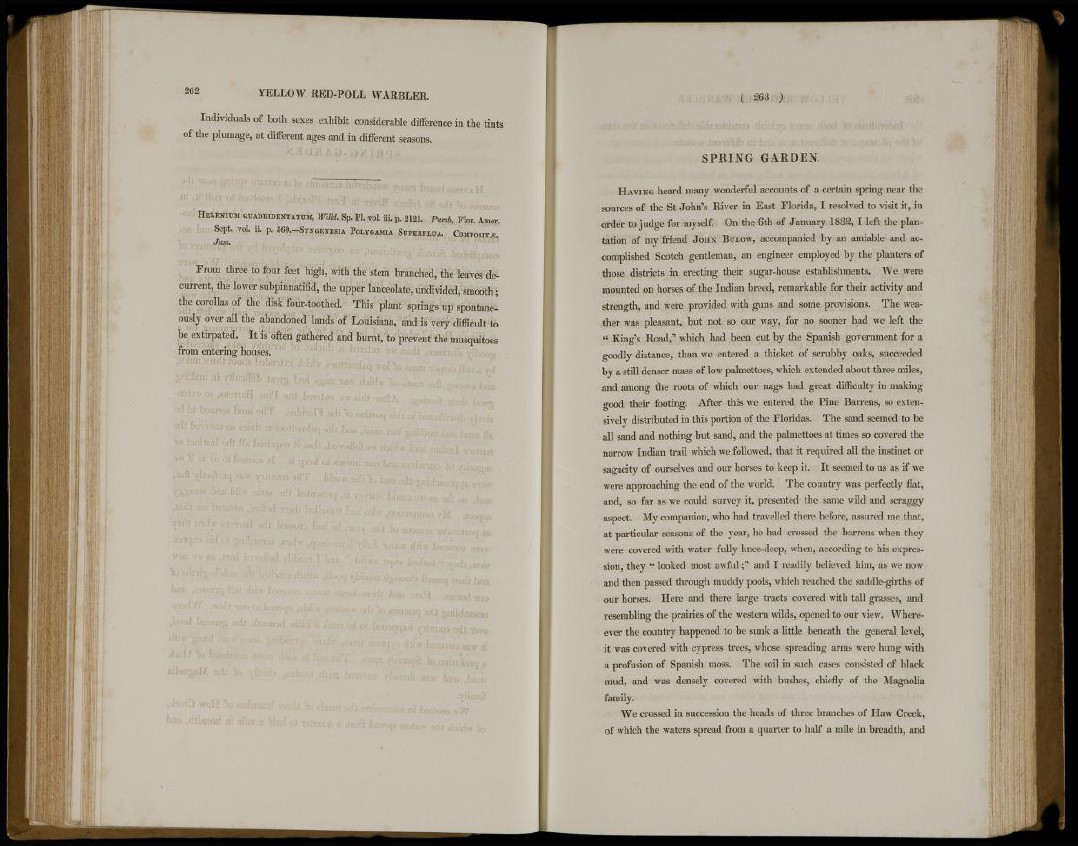
262 YELLOW RED-POLL WARBLER.
Individuals of both sexes exhibit considerable difference in the tints
of the plumage, at different ages and in different seasons.
HELENIUM QUADRIDEVTATUM, Willd. Sp. PI. vol. iii. p. 2121. Pursh, Flor. Amer.
Sept. vol. ii. p. 560.—SYNGENESIA POLYGAMIA SUPERFLUA. COMPOSITE,
Juss.
From three to four feet high, with the stem branched, the leaves decurrent,
the lower subpinnatifid, the upper lanceolate, undivided, smooth;
the corollas of the disk four-toothed. This plant springs up spontaneously
over all the abandoned lands of Louisiana, and is very difficult to
be extirpated. It is often gathered and burnt, to prevent the musquitoes
from entering houses.
( 263 )
S P R I N G GARDEN.
HAVING heard many wonderful accounts of a certain spring near the
sources of the St John's River in East Florida, I resolved to visit it, in
order to judge for myself. On the 6th of January 1832, I left the plantation
of my friend JOHN BULOW, accompanied by an amiable and accomplished
Scotch gentleman, an engineer employed by the planters of
those districts in erecting their sugar-house establishments. We were
mounted on horses of the Indian breed, remarkable for their activity and
strength, and were provided with guns and some provisions. The weather
was pleasant, but not so our way, for no sooner had we left the
" King's Road," which had been cut by the Spanish government for a
goodly distance, than we entered a thicket of scrubby oaks, succeeded
by a still denser mass of low palmettoes, which extended about three miles,
and among the roots of which our nags had great difficulty in making
good their footing. After this we entered the Pine Barrens, so extensively
distributed in this portion of the Floridas. The sand seemed to be
all sand and nothing but sand, and the palmettoes at times so covered the
narrow Indian trail which we followed, that it required all the instinct or
sagacity of ourselves and our horses to keep it. It seemed to us as if we
were approaching the end of the world. The country was perfectly flat,
and, so far as we could survey it, presented the same wild and scraggy
aspect. My companion, who had travelled there before, assured me that,
at particular seasons of the year, he had crossed the barrens when they
were covered with water fully knee-deep, when, according to his expression,
they " looked most a w f u l a n d I readily believed him, as we now
and then passed through muddy pools, which reached the saddle-girths of
our horses. Here and there large tracts covered with tall grasses, and
resembling the prairies of the western wilds, opened to our view. Whereever
the country happened to be sunk a little beneath the general level,
it was covered with cypress trees, whose spreading arms were hung with
a profusion of Spanish moss. The soil in such cases consisted of black
mud, and was densely covered with bushes, chiefly of the Magnolia
family.
We crossed in succession the heads of three branches of Haw Creek,
of which the waters spread from a quarter to half a mile in breadth, and